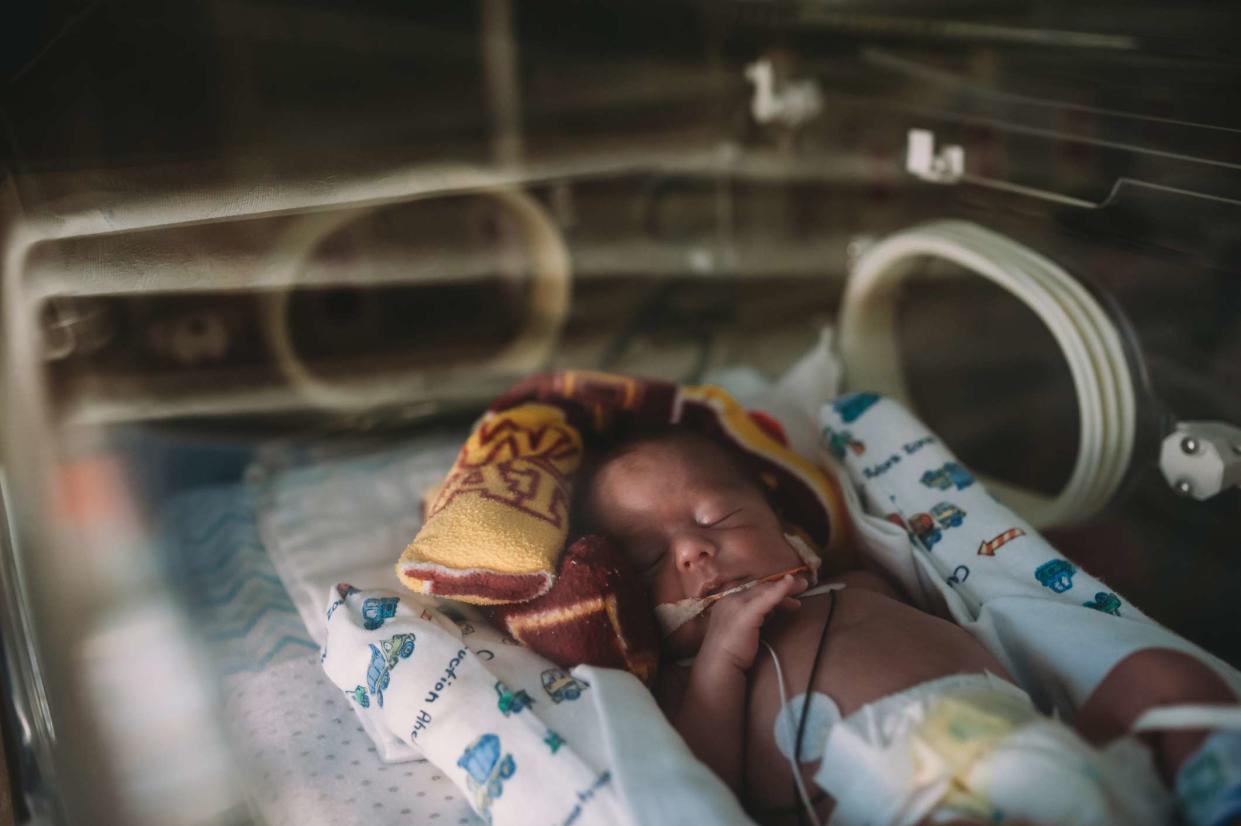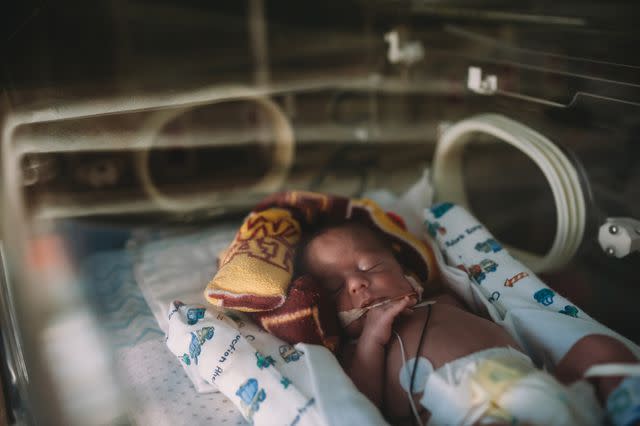Preterm Labor: How Many Weeks Is Early?

Jill Lehmann Photography / Getty Images
Medically reviewed by Peter Weiss, MD
Preterm labor is when labor starts at or before 37 weeks of pregnancy. Sometimes preterm labor stops on its own, but for most pregnant people, it will continue and require urgent medical attention as babies born preterm often face short-term and long-term health complications.
Preterm labor has recognizable signs and symptoms, which can help you determine if what you’re feeling is a normal part of pregnancy or an indication that you need to see a healthcare provider right away. Delaying labor can allow time for the baby to develop more and for you to receive appropriate care to reduce the risks of preterm birth complications.
This article discusses risk factors for preterm labor, how to tell if you’re in preterm labor, and what care to expect if preterm labor doesn’t stop on its own.

Jill Lehmann Photography / Getty Images
Preterm Labor: How Many Weeks Is Premature?
Usually, pregnancy lasts for about 40 weeks, but sometimes labor can start before then. Labor that starts before 37 weeks is considered preterm labor or premature labor. While preterm labor doesn’t always mean you will have a preterm birth, it does require immediate medical attention to try to delay birth and avoid risks associated with preterm birth.
Preterm labor can happen to any pregnant person, and the exact cause isn’t always known, but there are certain factors that may increase the risk. Factors that put pregnant people at high risk of preterm labor, as well as preterm birth, include:
Having experienced preterm labor before or having had a preterm birth
Being pregnant with multiple babies, such as twins or triplets
Use of reproductive technologies, such as in vitro fertilization
Certain abnormalities of the reproductive system, such as having a short cervix early on in your pregnancy (this is something a healthcare provider would diagnose)
Certain health conditions may also increase the risk of preterm labor and birth, including but not limited to:
Some vaginal infections, such as trichomoniasis or bacterial vaginosis
Some conditions that only occur during pregnancy, such as fetal developmental issues and placenta previa
Certain lifestyle factors like smoking or drinking alcohol while pregnant, low weight before pregnancy, and inadequate nutrition due to dietary deficiencies may also increase the risk of preterm labor and birth. These factors are modifiable, and taking steps to prevent these issues may reduce their associated risks.
Research suggests that environmental factors may also play a role in pregnancy outcomes. These environmental factors can be at the personal or social level, like stress or lack of social support, or at the physical environmental level, such as air pollutants.
For example, one study found that fine particulate matter and ozone (two elements of air pollution) increase the risk of preterm birth, and the risk may be higher among pregnant people with asthma and pregnant people who are Black. Where you live may impact this risk, such as living in areas with high pollution, like urban areas.
Such research is important as it shows that the risk of preterm labor and birth is not just about biology—social determinants of health and environmental factors can also have an impact.
How to Tell If You're in Preterm Labor
When you’re nearing the end of your pregnancy, it’s important to know which pregnancy symptoms are typical and which ones may be signs that you’re in preterm labor.
For example, Braxton-Hicks contractions, which may occur during the third trimester, are not signs of labor and are different from labor contractions in that they’re shorter, they come and go at irregular intervals, and they don’t get more severe or painful over time.
Preterm labor can be painful, including back aches and stomach cramps, and it's important to let your healthcare provider know if you suspect you're in preterm labor.
Symptoms of preterm labor include:
Bleeding or fluid leaking from the vagina
Contractions every 10 minutes or more frequently
Feeling of pressure in the pelvic area
Dull pain in the back
Stomach cramps that may or may not be accompanied by diarrhea
Cramping that feels like period cramps
Calling Your Healthcare Provider for Suspected Preterm Labor
If you’re feeling any symptoms of preterm labor or are unsure if what you’re feeling would be considered symptoms of preterm labor, call your healthcare provider right away or go to the emergency room. This is especially important if you’re having more than six contractions in an hour or are bleeding from your vagina.
Your healthcare provider may do the following tests or exams to determine whether you’re in preterm labor:
Checking to see if membranes have ruptured
Seeing if the cervix has dilated or thinned
Conducting a fetal fibronectin (fFN) test, which can predict whether a pregnant person experiencing preterm labor will have a preterm birth
Your healthcare provider might also do an ultrasound and record the fetal heart rate and your contractions.
What Happens When You're in Preterm Labor
If your healthcare provider determines that you’re in preterm labor, they may start you on a treatment plan to try to delay labor and prevent preterm birth to the extent possible. Treatments for preterm labor are currently limited.
Progesterone treatment (using a hormone to delay contractions) was thought to prevent preterm birth but is still being studied for its effectiveness.
While many people associate preterm labor with being prescribed bed rest, it’s a common misunderstanding that bed rest can help prevent preterm birth. In addition, bed rest can increase the risk of blood clots and weakening of the muscles, which can lead to loss of muscle strength. Thus, bed rest is generally not recommended as a treatment option when you’re in preterm labor.
Your healthcare provider may also provide you with medication, depending on the state of your and your fetus’s health. These medications may be given to you to:
Help the fetus’s organs develop and mature more quickly
Delay delivery of your baby for a short period of time
Reduce the risk of preterm complications
It’s best to speak with a healthcare provider about these treatment options early on in the pregnancy so that you can learn and talk about the benefits and risks of each option without the pressure and urgency of stopping preterm labor, should that happen.
Preterm Labor Risks in Newborns: Short-Term Risks
Going into preterm labor risks the baby being born too early. Preterm birth can have serious health consequences for the baby, both as a newborn and as they grow older.
The most notable short-term risk of preterm birth is the risk of losing the baby. Babies born prematurely, especially before 32 weeks, have an increased risk of death or disability. Such risks may extend into a newborn’s first several months of life.
In 2020, preterm birth and low birth rate were factors in the loss of 16% of babies who died before 1 year of age. Ask your healthcare provider about the short-term risks of preterm labor and birth based on your unique circumstances to help you feel more prepared.
Getting Support
It can be utterly frightening to not know whether your baby will live or experience serious health issues after preterm birth. You’re not alone. Talk to your healthcare provider about what to expect from preterm birth and support systems to help you get through what may be an incredibly trying time.
After giving birth, you may be wondering when you and your baby can go home. Babies born preterm may require special care in the neonatal intensive care unit (NICU). After delivery, a healthcare provider will examine the baby and determine whether they need to be moved to the NICU. Babies born before 28 weeks often face more complications and need the care the NICU provides.
Some health problems that a preterm baby may face and can require more specialized medical attention include:
Infections, such as neonatal sepsis
Breathing problems, such as respiratory distress syndrome, bronchopulmonary dysplasia, and apnea of prematurity
Intestinal problems (necrotizing enterocolitis)
Eye problems (retinopathy of prematurity)
Heart problems (patent ductus arteriosus)
Bleeding in the brain (intraventricular hemorrhage)
How long a baby needs to stay in the NICU depends on their health and developmental progress, such as ensuring their organs fully develop.
The baby will continue to get specialized care until essential metrics are met without the help of machines or NICU staff (like breathing on their own, eating through breastfeeding or bottle feeding, staying warm, and gaining weight). This can take weeks or months.
Talk to your healthcare provider about getting support during this time and how you can participate in your baby's care.
Preterm Labor Risks in Newborns: Long-Term Risks
Newborns who survive preterm birth may still be impacted by preterm birth complications in the long term. Long-term risks of babies who are born preterm may include:
Problems with feeding, such as breastfeeding
Problems with breathing
Delayed development
Hearing issues
Vision issues
Babies born preterm will get regular checkups to monitor their overall health and development. Tell your healthcare provider if you’re ever concerned about the health or development of your baby so that they can walk you through what to expect.
In addition to the physical health impacts on the baby, long-term complications from preterm birth can have significant emotional and financial impacts on the parents and families of preterm babies. Social support, such as from support groups, may not take the pain away, but it may help.
Why You Might Not Be Able to Stop Preterm Labor
While you can reduce some risk of preterm labor through lifestyle choices like not smoking, there are some risk factors outside of your control, like having experienced preterm labor in the past, being pregnant with multiple babies, or having certain reproductive complications like a short cervix.
For 30% of pregnant people, preterm labor will stop on its own. Those who are in active preterm labor that doesn’t subside on its own may receive treatments to delay birth and potentially reduce the risk of complications if the baby is born preterm. Some of these medications may temporarily stop labor contractions.
However, if you’re more than 34 weeks pregnant and your baby’s lungs are developed, healthcare providers may not stop preterm labor in the interest of your and your baby’s health.
Summary
Preterm labor is labor that starts before 37 weeks of pregnancy and poses both short- and long-term risks to the health of the baby if they are born preterm. There are several risk factors associated with preterm labor, some of which can be modified.
A pregnant person experiencing signs of preterm labor should contact their healthcare provider right away or go to an emergency room to receive treatment to delay delivery and/or get care to reduce the risks of preterm birth complications.

